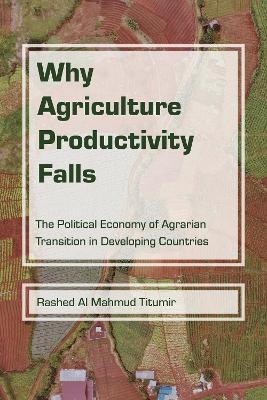
Why Agriculture Productivity Falls
Purdue University Press (Verlag)
978-1-61249-832-4 (ISBN)
Why Agriculture Productivity Falls: The Political Economy of Agrarian Transition in Developing Countries offers a new explanation for the decline in agricultural productivity in developing countries. Transcending the conventional approaches to understanding productivity using agricultural inputs and factors of production, this work brings in the role of formal and informal institutions that govern transactions, property rights, and accumulation. This more robust methodology leads to a comprehensive, well-balanced lens to perceive agrarian transition in developing countries. It argues that the existing process of accumulation has resulted in nonsustainable agriculture because of market failures—the result of asymmetries of power, diseconomies of scale, and unstable property rights. The book covers the historical shifts in land relations, productivity, and class relations that have led to present-day challenges in sustainability. The result is arrested productivity growth. Agrarian transition should be understood in the context of the wider economic development in society, including how political settlement and primitive accumulation inhibited the kind of property rights that encourage growth. Why Agriculture Productivity Falls is a much-needed corrective to the traditional understanding, because before we can increase productivity, we must understand the root causes of those challenges.
Rashed Al Mahmud Titumir is a professor of economics in the Department of Development Studies of the University of Dhaka, Bangladesh. His career has spanned a variety of settings, including government, think tanks, international organizations, and media, in addition to academia. He is the author of Fiscal and Monetary Policies in Developing Countries: State, Citizenship and Transformation; State Building and Social Policies in Developing Countries: The Political Economy of Development; and Numbers and Narratives in Bangladesh's Economic Development. He coauthored Natural Resource Degradation and Human-Nature Wellbeing: Cases of Biodiversity Resources, Water Resources, and Climate Change. He is editor of Sundarbans and Its Ecosystem Services: Traditional Knowledge, Customary Sustainable Use and Community Based Innovation.
| Erscheinungsdatum | 21.04.2023 |
|---|---|
| Zusatzinfo | 21 illustrations |
| Verlagsort | West Lafayette |
| Sprache | englisch |
| Maße | 152 x 229 mm |
| Gewicht | 216 g |
| Themenwelt | Wirtschaft ► Betriebswirtschaft / Management |
| Weitere Fachgebiete ► Land- / Forstwirtschaft / Fischerei | |
| ISBN-10 | 1-61249-832-9 / 1612498329 |
| ISBN-13 | 978-1-61249-832-4 / 9781612498324 |
| Zustand | Neuware |
| Informationen gemäß Produktsicherheitsverordnung (GPSR) | |
| Haben Sie eine Frage zum Produkt? |
aus dem Bereich


